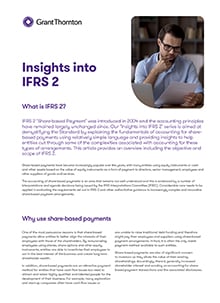-
Compliance
Assistance in the design, implementation and monitoring of Compliance programs within the framework of local and international regulations (FCPA, Corporate Criminal Responsibility Law), including course delivery.
-
Forensic
The services offer includes expert advice in litigation resolution and the development of procedures in legal/digital forensics and cybersecurity.
-
Human Capital solutions
Grant Thornton's Human Capital division has a team of professionals determined to accompany individuals and organizations throughout the relationship between the employee and the organization.
-
Organizational restructuring
Advice on operational restructuring to companies in difficulty, their creditors or other interested parties.
-
Services to the Government and the Public Sector
Financial audit projects and special technical and concurrent reviews of programs of national and subnational governments financed by International Credit Organizations. Special projects for government entities, public and mixed companies.
-
Sustainability
Learn how our sustainability services can help you go beyond and build a strong reputation, attract committed investors and generate long-term sustainable financial results.
-
Transaction Advisory Services
The service offer includes financial due Diligence, operations services, business and strategic intelligence, ratings, advice on mergers and acquisitions, capital markets and debt advice.
-
Valuation Services
We provide stock, business, asset, and liability valuations in support of negotiations, account structuring, and tax opportunities.
-
Academy - Empowered by Grant Thornton Argentina & Perú
Academy is an e-learning platform that emerged as a joint initiative of Grant Thornton Argentina and Grant Thornton Perú. It is designed so that everyone can acquire new skills in accounting, auditing, taxes, technology and business through access to multiple courses and certifications.
-
Audit methodology and technology
At Grant Thornton we use a single audit methodology across our global network. We apply it through LEAP, an integrated software audit tool. Get to know it now.
-
External audit
We offer services of external audit of financial statements, assurance reports, agreed-upon procedures reports and certifications, due-diligence and take-over of companies.
-
Prevention of money laundering and financing of terrorism
At Grant Thornton we provide advice to our clients in the development of an Asset Laundering and Terrorist Financing Prevention strategy that allows them to prevent risks in a comprehensive manner.
-
Professional standards and training
Our IFRS advisors can help you navigate the complexity of the standards so you can spend your time and effort on your business.
-
Accounting, administration and finance services
Effective accounting and financial advisory are necessary for the success of an innovative and forward-thinking organization. We provide our knowledge and experience so you can stay focused on your business's core activities.
-
Payroll
We have the experience and the know-how to perform payroll for various industries, including those in which trade unions and workers' organisations are active.
-
Start-up of companies
The early stages of a business are key to its success. Therefore, it's important to have experts who manage and administer business resources. Learn about our solutions to help you build your company.
-
Tax outsourcing
Taxes have a significant impact on business decisions. At Grant Thornton, we respond quickly and design tailored solutions to ensure organizations are not adversely affected.
-
FIU Independent External Reviewer - AML/CFT
We participate in the implementation of the requirements of the FIU in leading companies and our services ensure an orderly framework, optimizing the investment.
-
Cybersecurity
As sophisticated digital manipulations become more prevalent, organizations must strengthen their defences and effectively protect themselves from threats and recognize those that are not. Organizations must act quickly to strengthen trust and resilience. A combination of enhanced security capabilities, robust controls, and employee education and awareness is critical.
-
ITGC Controls
Information Technology General Controls (ITGC) are a set of policies that ensure the effective implementation of control systems throughout an organization. ITGC audits help verify that these general controls are implemented and functioning correctly, so that risk is appropriately managed.
-
Creation and acquisition of Financial Entities
We have the knowledge and experience in activities related to the acquisition and creation of financial entities, both locally and internationally.
-
Financial statements audit
We offer services of external audit of financial statements; assurance reports, agreed procedures and certifications; due-diligence and take-over of companies.
-
Internal audit
An internal audit helps identify gaps, deficiencies, and potential for inherent risk in all facets of the organization.
-
IT Internal Audit
IT has been, and will increasingly be, a key factor for success and operational efficiency in all industries. Innovations such as the cloud and virtualization, and new threats around data security, have reinforced the importance and increased the risks associated with the use of technology for our clients.
-
Legal audit
The monitoring of the legal area is usually a complex and difficult task for organizations, which however cannot be neglected.
-
Responsible for regulatory compliance
At Grant Thornton we offer the service of acting as "Responsible for Regulatory Compliance and Internal Control" for companies that requested registration as Settlement and Clearing Agent and Trading Agent.
-
SOC 1, SOC 2 and SOC 3 Reports
At Grant Thornton, we support our clients in obtaining SOC 1, SOC 2 and SOC 3 reports, enabling them to provide assurance to their clients and partners regarding the design, implementation and operation of adequate internal controls, highlighting the organisation’s commitment to the highest standards of control and security.
-
Services to private clients
Wherever you are in the world, our tax specialists can help you with your interests and investments abroad.
-
Global Mobility Services
Sending someone abroad involves liabilities and obligations. We offer interesting solutions to minimize the tax burden for both parties.
-
Direct Tax
We provide clear and practical solutions that meet your specific business needs, in the most tax-efficient way possible.
-
Indirect Tax
Grant Thornton's tax teams take a rigorous approach to help you meeting your tax obligations, whatever challenges you may face along the way.
-
International taxes – Transaction support
We offer our international experience in the field and make available the resources to plan and adequately comply with regulatory frameworks.
-
LATAM Tax Newsletter
Stay informed with the latest tax developments across Latin America with the LATAM Tax Newsletter, prepared by our experts throughout the Americas.
-
Clean energy and technology
Growing demand, development of new ways of energy and a need for a sustainable future: we support our clients in these changes to be one step beyond their competitors.
-
Mining
Our flexible, partner-led teams are dynamic and focused on development. We take time to understand the details of the client’s business and offer unique solutions.
-
Oil and gas
Our Oil & Gas teams have the deep knowledge, wide experience and vision needed to offer our clients practical solutions adapted to their businesses.
-
Banking
Grant Thornton offers meaningful and accurate solutions for operational and transactional issues, litigation and administrative disputes in banking.
-
Private capital
We gather international teams of experts in corporate finance, restructuring and recovery, tax and insurance services to deliver customized solutions from initial investment, through development stages until the end of each project.
-
Fintech
We work to take advantage of all opportunities and manage industry risks, allowing our clients to always be one step beyond their competitors.
-
Asset management
We have specialized teams in more than 140 markets delivering solutions regarding insurance, taxes and advisory to global, international, regional, local asset managers.
-
Insurance
Thanks to our specialized team we offer accurate solutions for operational and transactional matters, litigations and administrative conflicts.

Share-based payments have become increasingly popular over the years, with many entities using equity instruments or cash and other assets based on the value of equity instruments as a form of payment to directors, senior management, employees and other suppliers of goods and services.
The accounting of share-based payments is an area that remains not well understood and this is evidenced by a number of Interpretations and agenda decisions being issued by the IFRS Interpretations Committee (IFRIC). Considerable care needs to be applied in evaluating the requirements set out in IFRS 2 and other authoritative guidance to increasingly complex and innovative share-based payment arrangements.
Why use share-based payments
One of the most persuasive reasons is that share-based payments allow entities to better align the interests of their employees with those of the shareholders. By remunerating employees using shares, share options and other equity instruments, entities are able to incentivise their employees to act in the best interest of the business and create long-term shareholder wealth.
In addition, share-based payments are an attractive payment method for entities that have cash flow issues but need to attract and retain highly qualified and talented people for the development of their business. For example, many exploration and start-up companies often have cash flow issues or are unable to raise traditional debt funding and therefore might pay their employees and suppliers using share-based payment arrangements. In fact, it is often the only viable payment method available to such entities.
Share-based payments are also of significant concern to investors as they dilute the value of their existing shareholdings. Accordingly, there is generally increased shareholder interest and scrutiny on accounting for share-based payment transactions and the associated disclosures.
Objective of IFRS 2
The objective of IFRS 2 is to specify the financial reporting by an entity when it undertakes a share-based payment transaction. In particular, it requires an entity to reflect the effects of share-based payments in its financial statements, including expenses related to share options granted to employees.
Definition of a share-based payment
A share-based payment is accounted for in accordance with IFRS 2 if it meets the definition of a share-based payment transaction and it is not specifically scoped out of the standard. Download What is IFRS 2? for a more detailed definition of a share-based payment.
The definitions show that IFRS 2 applies not only to share-based payments directly between the reporting entity and its suppliers or employees, but also to share-based payments that involve other group entities and their suppliers or employees.
Scope of IFRS 2
When does IFRS 2 apply?
In practice, IFRS 2 applies to a range of situations as follows:
- Employees are granted shares or other equity instruments (eg share options) in exchange for services received
- Non-employees (eg external suppliers) are issued or paid in shares or other equity instruments, in exchange for goods or services received
- Suppliers or employees are paid in cash (or other assets) in exchange for goods or services received, where the amount of the payment is based on the price of equity instruments (eg cash share appreciation rights).
For IFRS 2 to apply, the equity instruments transferred or used as a basis for the amount of payment must be those of the entity or another group entity.
Does IFRS 2 apply to all share transactions with employees?
Employees sometimes receive equity instruments in their capacity as a shareholder rather than in their capacity as an employee. For example, an employee may already hold shares in an entity from past share-based payments. If the entity decides to grant all of its shareholders (which includes its employees to the extent that the instruments that were issued were not subject to any service conditions) an option to purchase additional shares at less than fair value, such a transaction is not within the scope of IFRS 2 as the employee is receiving the payment in their capacity as a shareholder rather than as an employee.
Do the goods or services received need to be identifiable?
IFRS 2 applies to share-based payments in which an entity (or another group entity) receives goods or services. Share-based payments are often exchanged for employee services, but can also include services provided by non-employees such as consulting, advisory, legal advice, etc. Goods can include inventories, consumables, property, plant and equipment, intangible assets and other non-financial assets.
In some cases, it may be difficult to identify the specific goods or services received from parties other than employees. Even when there are identifiable goods or services, the identifiable consideration received in the form of those goods or services could be less than the fair value of the equity instruments granted.
IFRS 2 presumes, when making a share-based payment, that the entity would expect to receive some goods or services in return for the equity instruments issued, as it would not issue valuable consideration in exchange for nothing. For example, an entity that issues shares to the benefit of disadvantaged communities, in exchange for no identifiable goods or services (eg black economic empowerment in South Africa), still benefits from enhancing its image as a good corporate citizen.
Accordingly, the Standard concludes that in the absence of specifically identifiable goods or services, other circumstances may indicate that unidentifiable goods or services have been (or will be) received, in which case IFRS 2 still applies to account for the cost of those unidentified goods or services.
Note that IFRS 2 does not apply where the transfer of shares or options is clearly for a purpose other than payment for goods or services (eg a transfer to settle a shareholder’s personal obligation to an employee that is unrelated to employment, or if the shareholder and employee are related and the transfer is a personal gift attributable to that relationship).
Does IFRS 2 apply to arrangements where the equity instruments are granted by another group entity (or by a shareholder of any group entity)?
In some cases, share-based payment arrangements may be settled by another group entity (or a shareholder of any group entity) on behalf of the party receiving the goods or services. For example, a parent may issue its own shares or options to a subsidiary’s employees or suppliers, for various legal or tax reasons, or a shareholder of the parent may award shares in the parent as settlement for goods or services received by the subsidiary.
IFRS 2 is clear that its requirements apply even where the entity receiving the goods or services has no direct obligation to settle a share-based payment arrangement (ie because another group entity or shareholder has the obligation to settle it). Similarly, IFRS 2 also applies in the financial statements of the entity required to settle the share-based payment arrangement on behalf of another group entity receiving the goods or services.
Does IFRS 2 apply to share-based payment transactions that are business combinations or form part of a business combination?
IFRS 2 applies to share-based payment transactions in which an entity acquires goods or services. However, entities often acquire net assets in a business combination, where the consideration paid or payable may include shares or other equity instruments. IFRS 3 ‘Business Combinations’, the more specific standard dealing with business combinations, applies to such transactions. Therefore, the equity instruments issued in exchange for control of an acquiree in a business combination are not within the scope of IFRS 2.
However, the acquirer sometimes also grants equity instruments to employees of the acquiree in their capacity as employees (eg in return for their continuing service after the business combination has taken place). Such share-based payments are within the scope of IFRS 2. IFRS 2 also applies to any cancellations, replacements or other modifications of existing share-based payment arrangements that occur because of a business combination or other equity restructurings.
In some cases, the selling shareholders of the acquiree will continue on as employees of the acquiree following a business combination. If those sellers receive a share-based payment as part of the business combination, guidance in IFRS 3 must be applied to determine what portion of the equity instruments issued is (a) in return for future services to be provided postcombination, and therefore within the scope of IFRS 2, or (b) part of the consideration transferred to obtain control of the acquiree, and therefore within the scope of IFRS 3 instead.
Does IFRS 2 apply to transactions that are within the scope of IAS 32 ‘Financial Instruments: Presentation’ or IFRS 9 ‘Financial Instruments’?
IFRS 2 applies to share-based payments in which goods or services are acquired. As noted earlier, the term ‘goods’ includes non-financial items. This means share-based payments involving financial assets that fall within the scope of IAS 32 or IFRS 9 are excluded from the scope of IFRS 2.
Even contracts to acquire non-financial items or services are excluded from IFRS 2 if the contract itself falls within the scope of IAS 32 and IFRS 9. For example, contracts to purchase commodities for short-term profit-taking rather than for the entity’s expected purchase, sale or usage requirements (ie the contract is not an ‘own use’ contract) must be treated as financial instruments under IAS 32 and IFRS 9 even if the contract is settled with a share-based payment.
However, equity instruments granted by a borrower to a lender as part of a financing agreement may fall within the scope of IFRS 2 if they were issued in exchange for services provided by the lender, as opposed to forming part of the overall return to the lender (which would fall under IFRS 9 instead). Judgement may be required to determine whether the equity instruments transferred are remuneration for a distinct service versus the fees that form part of the lender’s return.
Download What is IFRS 2? for a practical insight – Relationship between IFRS 2 and IAS 32 when share-based payments are used to acquire a group of assets.
Does IFRS 2 apply to financial assets outside the scope of IAS 32 or IFRS 9, such as the acquisition of investments in subsidiaries, associates or joint ventures?
As mentioned above, share-based payments involving the acquisition of financial assets that fall within the scope of IAS 32 or IFRS 9 are excluded from the scope of IFRS 2. However, while investments in subsidiaries, associates and joint ventures are financial assets, they are also scoped out of IFRS 9 when an entity’s policy choice is to account for them at cost or using the equity method in its unconsolidated financial statements. In other words, such investments are outside the scope of both IFRS 2 and IFRS 9.
As a result, there is no specific guidance in IFRS for a transaction to acquire an interest in a subsidiary, associate or joint venture in exchange for shares or other equity instruments. Entities would need to develop an accounting policy for such transactions. For example, by referring to IAS 28 ‘Investments in Associates and Joint Ventures’ [i] and considering whether it would be appropriate to analogise to other standards, such as IFRS 3, and applicable IFRIC (International Financial Reporting Interpretations Committee) Agenda decisions, to determine the cost of the investment.
Under the general principles in IFRS 2, an entity recognises the goods or services acquired in a share-based payment transaction at the time when the goods are acquired or as the services are rendered by the counterparty.
Services are typically consumed as they are received, in which case an expense is recognised as the counterparty provides the service. On the other hand, some services may qualify for capitalisation as part of an asset (eg as part of inventory, property, plant and equipment, or intangible assets) and therefore would be expensed later, as the asset is consumed.
In contrast, goods are often consumed over a period of time, in which case an expense is recognised as the entity consumes the goods. Where goods are sold at a future point in time (eg inventories), an expense is recognised when the goods are sold. However, it is also possible that some goods will need to be expensed before they are consumed or sold, in particular when they do not qualify for recognition as assets (eg purchase of goods during the research phase of a project to develop a new product, where the goods do not qualify for recognition as assets under the applicable accounting standard).
How we can help
We hope you find the information in this article helpful in giving you some detail into aspects of IFRS 2. If you would like to discuss any of the points raised, please contact us.
_______________________________
i. ifrs.org - IAS 28 ‘Investments in Associates and Joint Ventures







